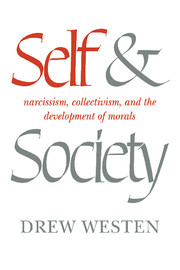Book contents
- Frontmatter
- Contents
- Preface
- Part I A theory of personality
- Part II A theory of culture
- Part III Personality and culture: a synthesis
- 8 Culture and personality: dying species or vigorous hybrid?
- 9 Psychic and sociocultural structure and dynamics
- 10 Personality and communitarian collectivism
- 11 The psychodynamics of modernization
- 12 Personality and sociocultural change
- 13 Breakdown and recovery: paradigmatic processes in personal identity and cultural integration
- 14 Personality and individuation
- References
- Index
8 - Culture and personality: dying species or vigorous hybrid?
Published online by Cambridge University Press: 11 November 2009
- Frontmatter
- Contents
- Preface
- Part I A theory of personality
- Part II A theory of culture
- Part III Personality and culture: a synthesis
- 8 Culture and personality: dying species or vigorous hybrid?
- 9 Psychic and sociocultural structure and dynamics
- 10 Personality and communitarian collectivism
- 11 The psychodynamics of modernization
- 12 Personality and sociocultural change
- 13 Breakdown and recovery: paradigmatic processes in personal identity and cultural integration
- 14 Personality and individuation
- References
- Index
Summary
In one of the most impressive essays ever written on the common ground between psyche and society, Malinowski comments,
The problem of the relation between group and individual is so pervading and ubiquitous that it cannot be treated detached from any question of culture and of social or psychological process. A theory which does not present and include at every step the definitions of individual contributions and of their integration into collective action stands condemned. (1939, p. 962)
The aim of Part III is to integrate the theory of personality of Part I and the theory of culture of Part II to move a step closer, albeit a small step, to the fulfillment of Malinowski's prescription. The present chapter will begin by reviewing past and present approaches to the study of personality and culture. Chapter 9 will examine the relationship between psychic and sociocultural structure and dynamics, placing the model of set-goals, affects, and control mechanisms in cultural context. Chapter 10 will discuss the psychology of communitarian collectivism. Chapter 11 will explore the psychodynamics of modernization, and Chapter 12 will examine some aspects of personality and social change, reinterpreting data relating to a crisis surrounding a ritual in changing times in Java. Chapter 13 explores the relation between personal identity and cultural integration, and the final chapter examines the psychology of individuated collectivism, concluding with some comments on morality and individuation.
The Totem-Pole-Is-a-Symbolic-Penis Approach
One can find historical antecedents to any school of thought; all contemporary ideas are, no doubt, a detailed footnote to Plato, and Plato's thought is probably itself a footnote to some magnificent anonymous australopithecine.
- Type
- Chapter
- Information
- Self and SocietyNarcissism, Collectivism, and the Development of Morals, pp. 285 - 298Publisher: Cambridge University PressPrint publication year: 1985



